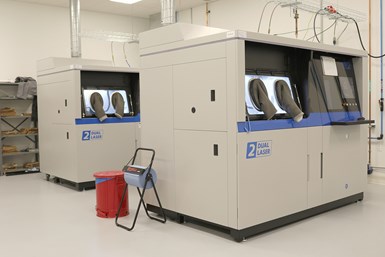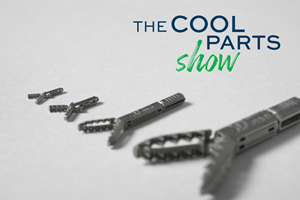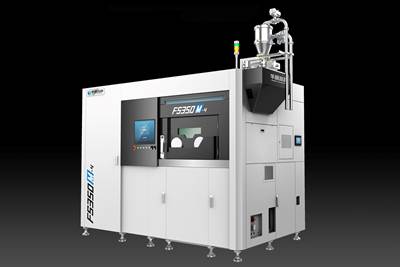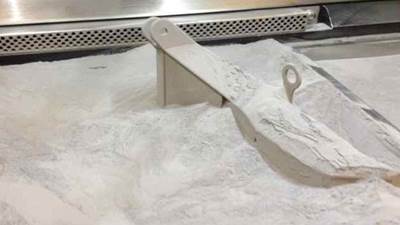Materialise Opens Medical 3D Printing Facility
At the new facility in Plymouth, Michigan, Materialise specializes in the 3D printing of personalized titanium cranio-maxillofacial (CMF) implants for more patient-specific care.
Materialise is working to accelerate the delivery of patient-specific medical implants to patients in the United States with the opening of a new 3D printing facility in Plymouth, Michigan. Surgeons are increasingly embracing 3D printing solutions as they recognize the added value it brings to personalized patient care, including more predictable and accurate surgical outcomes, and time savings during surgery.
At the new facility in Plymouth, Michigan, Materialise specializes in the 3D printing of personalized titanium cranio-maxillofacial (CMF) implants. CMF implants are used for facial reconstructive surgery. Until now, Materialise manufactured titanium CMF implants solely at its 3D printing facility in Belgium. With a dedicated metal 3D printing facility in the U.S., the company can respond to surgeons’ needs with greater reliability while significantly reducing the delivery time of fully personalized implants to hospitals across the U.S. This expansion of capabilities complements Materialise’s existing production of 3D printed surgical guides and anatomical models in the United States.
“With the opening of our new metal 3D printing center in the U.S., we bring personalized care closer to U.S. patients,” says Brigitte de Vet, vice president of medical at Materialise. “The power of 3D printing paired with our three decades of experience in 3D planning and medical manufacturing, allows us to accelerate the delivery of personalized medical implants. We take pride in leading the charge to revolutionize patient-specific care and with our dedicated facility in Michigan we further enhance personalized care in the United States."
The advent of technologies such as 3D printing and advanced visualization techniques has transformed personalized patient care. Patient-specific 3D printed medical solutions include anatomical models for diagnostic purposes, and surgical guides and implants to enhance accuracy and efficiency. These solutions are designed to bolster surgeons’ comfort before and during surgery, leading to more predictable and accurate surgical outcomes. As a result, surgeons increasingly adopt 3D printing as part of their medical practices to bring personalized care closer to patients and to reduce overall costs.
Materialise has more than three decades of experience in developing medical solutions and offers a comprehensive range of 3D printed guides and implants. The company produces 280,000 personalized 3D printed instruments and implants per year, including 160,000 for the U.S. market.
The company says it has pioneered numerous groundbreaking medical 3D printing applications. In 2017, it introduced one of the first personalized CMF implant portfolios in the U.S. In 2021, its 3D planning and 3D printed instruments played a pivotal role in the world’s first simultaneous double hand and face transplant that was successfully performed at NYU Langone Health in Manhattan, New York.
- Read about EOS’ adoption of Materialise CO-AM Software Platform to improve internal additive manufacturing efficiency. The CO-AM platform is designed to enhance traceability and connectivity in the company’s internal additive manufacturing processes.
- Learn how GKN Aerospace and Materialise are partnering to propel additive manufacturing in aviation. Materialise supported the delivery of the additively manufactured wing tip for Eviation’s Alice, the world's largest all-electric aircraft, which made its maiden flight in 2022.
- Find out how Materialise’s surgical guides illustrate the promise of mass customization. The company’s interconnected software systems enable production via additive manufacturing of a product tailored to individual surgeries.
Related Content
Q&A With Align EVP: Why the Invisalign Manufacturer Acquired Cubicure, and the Future of Personalized Orthodontics
Align Technology produces nearly 1 million unique aligner parts per day. Its acquisition of technology supplier Cubicure in January supports demand for 3D printed tooling and direct printed orthodontic devices at mass scale.
Read More3D Printed PEEK Spine Implants in Production: The Cool Parts Show Bonus
Curiteva is using Fused Strand Deposition to produce two different lines of FDA-cleared spine implants. We visited the company’s Huntsville, Alabama, facility to learn more.
Read MoreMicro Robot Gripper 3D Printed All at Once, No Assembly Required: The Cool Parts Show #59
Fine control over laser powder bed fusion achieves precise spacing between adjoining moving surfaces. The Cool Parts Show looks at micro 3D printing of metal for moving components made in one piece.
Read MoreOvercoming Challenges with 3D Printing Nitinol (and Other Oxygen-Sensitive Alloys) Through Atmospheric Control
3D printed nitinol has potential applications in dental, medical and more but oxygen pickup can make this material challenging to process. Linde shares how atmospheric monitoring and the use of special gas mixtures can help maintain the correct atmosphere for printing this shape alloy and other metals.
Read MoreRead Next
Bike Manufacturer Uses Additive Manufacturing to Create Lighter, More Complex, Customized Parts
Titanium bike frame manufacturer Hanglun Technology mixes precision casting with 3D printing to create bikes that offer increased speed and reduced turbulence during long-distance rides, offering a smoother, faster and more efficient cycling experience.
Read MoreCrushable Lattices: The Lightweight Structures That Will Protect an Interplanetary Payload
NASA uses laser powder bed fusion plus chemical etching to create the lattice forms engineered to keep Mars rocks safe during a crash landing on Earth.
Read MorePostprocessing Steps and Costs for Metal 3D Printing
When your metal part is done 3D printing, you just pull it out of the machine and start using it, right? Not exactly.
Read More





















